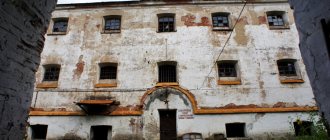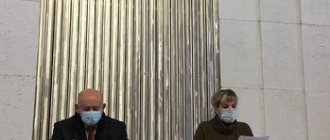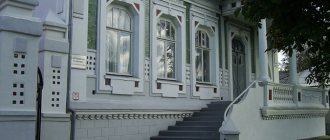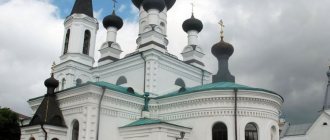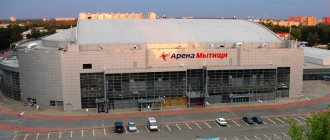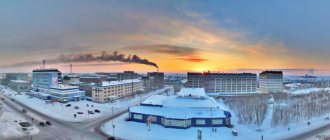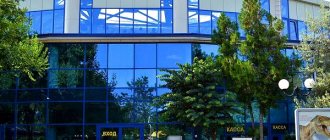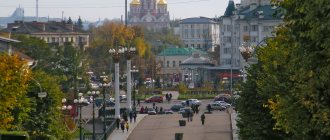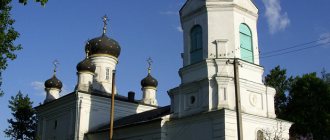. It is the administrative center of the Anzhero-Sudzhensky urban district.
The history of Anzhero-Sudzhensk begins with the construction of the Great Siberian Route in the nineties of the 19th century. In connection with the construction of the railway, major geological research was organized. As a result, large coal reserves were discovered on the territory of modern Anzhero-Sudzhensk.
Railway in Anzhero-Sudzhensk
In 1896-1898, with the beginning of the development of coal deposits, the settlements of Anzherka and Sudzhenka appeared. The village of Anzherka was named for its location on the Anzhera , and the name of the village of Sudzhenka was transferred by immigrants from the Kursk province, where there is a river and the city of Sudzha
.
In 1928, two overgrown villages of Anzherka and Sudzhenka merged into one - Anzhero-Sudzhensky . In 1931, by a resolution of the All-Russian Central Executive Committee, the village was given the status of a city. In the summer of 1981, Anzhero-Sudzhensk solemnly celebrated its 50th anniversary; since then, City Day
.
Most of the population of Anzhero-Sudzhensk live in private houses.
Nowadays, Anzhero-Sudzhensk lives and develops despite the difficult economic situation and the closure of mines. In recent years, the city has noticeably transformed, this is noted by everyone: both residents of Anzhero-Sudzhensk and guests of the city.
A great impetus for the improvement of Anzhero-Sudzhensk received during the preparation and holding of the regional holiday Miner's Day
in 2007. For the large-scale celebration, colossal work was done on the reconstruction and construction of a number of infrastructure facilities. New flower beds were laid out in the city, new alleys were planted, and various small architectural forms appeared. As a result, Anzhero-Sudzhensk became prettier, cleaner and more modern.
In the year of celebrating the 110th anniversary of the start of coal mining in the Sudzhensky mines and on the 60th anniversary of the miners' holiday, the city was visited by miners not only from Kuzbass, but from all over Russia.
Central House of Culture in Anzhero-Sudzhensk
Every year Anzhero-Sudzhensk becomes more and more beautiful and modern. New residential areas are being built in the city, and picturesque parks are appearing.
One of the new parks is the Central Park of Culture and Leisure
is a meeting place and walks for citizens of all ages.
The central park has a lot of green spaces, handmade wrought-iron benches and a beautiful lovers' tree, on which newlyweds hang locks in honor of their love and devotion. Children's parties with animators are often held here, and a variety of attractions are also provided for children.
The park of culture and recreation is located next to the Anzherskaya , so guests of Anzhero-Sudzhensk most often begin their acquaintance with the city from this park.
Hotel " Anzherskaya"
» in Anzhero-Sudzhensk
What else should tourists see in Anzhero-Sudzhensk?
City Museum of Local Lore
The city museum of local lore , which is rightfully considered one of the best in Kuzbass , was opened on July 3, 1981. The museum preserves the true history of the development of Anzhero-Sudzhensk. The museum also presents a large exhibition of exhibits related to the flora and fauna of Kuzbass, which clearly gives an idea of the animal and plant world of the Siberian region. When visiting the museum, a polite guide will captivatingly tell you about the history of Anzhero-Sudzhensk, its heroic inhabitants and the nature of the mining region. Address of the city local history museum of Anzhero-Sudzhensk: Lenin street, house 12.
Links[edit]
Notes[edit]
- ^ abcde Law No. 215-OZ
- ^ a b Federal State Statistics Service (2011). “All-Russian Population Census 2010. Volume 1" [All-Russian Population Census 2010, vol. 1]. All-Russian Population Census 2010 [All-Russian Population Census 2010]
. Federal State Statistics Service. - "26. The size of the permanent population of the Russian Federation by municipalities as of January 1, 2022". Federal State Statistics Service. Retrieved January 23, 2022.
- ^ abc Law No. 104-OZ
- "On the Calculation of Time". Official Internet portal of legal information
. June 3, 2011. Retrieved January 19, 2022. - Post office. Information and computing center of OASU RPO. ( Post office
).
Search for postal service objects ( postal Search for objects
) (in Russian) - ↑
Federal State Statistics Service of Russia (May 21, 2004).
“The population of Russia, the constituent entities of the Russian Federation as part of federal districts, urban settlements, settlements, settlements is 3 thousand or more people” [Population of Russia, its federal districts, federal districts, districts Urban settlements, rural settlements - administrative centers and rural settlements with a population of over 3,000] (XLS). All-Russian Population Census 2002
. - “All-Union Population Census of 1989. The current population of union and autonomous republics, autonomous regions and districts, territories, negative phenomena, urban settlements and rural district centers” [All-Union Population Census of 1989: current population of union and autonomous republics, Autonomous regions and districts , territories, regions, districts, towns and villages performing the functions of district administrative centers. All-Union Population Census of 1989 [All-Union Population Census of 1989]
.
Institute of Demography of the National Research University: Higher School of Economics [Institute of Demography of the National Research University: Higher School of Economics]. 1989 - via Demoscope Weekly
.
Sculptural composition “Tales of Lenin”
In 2013, an unusual monument with the warm, soulful name “Tales of Childhood” . The creators of the sculptural composition captured the moment when little children listen attentively to an interesting fairy tale being told to them by their beloved grandfather, and a cute little bob is nestled next to them.
Attraction address: Lenin street, building 7.
Local features
There is no tourist infrastructure in Anzhero-Sudzhensk. The city has the only three-star hotel “Central”, one restaurant attached to it and several cafes. You can have lunch in the Zhili-byli cafe (opposite the city administration building) or in the Rus cafe (in the central market) for only 150 rubles. Entertainment options include the Raduga cinema and the Led nightclub, which calls itself “elite”: parties, billiards, striptease. There are three palaces of culture in different urban areas and a Center for National Culture (Russian, German, Cossack and Tatar). The Local History Museum has been operating since 1981.
See also: Sights of Scandinavia
From the Anzhero-Sudzhensk bus station you can go to Tomsk and Kemerovo, as well as to the Anzhersky sanatorium, 14 km from the city. It stands on the Yaya River, in a pine forest. Specialization: treatment of respiratory organs, cardiovascular diseases, diseases of the nervous system and musculoskeletal system.
A special plot in the history of Anzhero-Sudzhensk is connected with the biography of Spartak Mishulin: according to his own stories, he was born again here. In 1942, the future People's Artist came to Anzhero-Sudzhensk with the artillery school, where he entered to study, but in the late 40s he ended up in a local colony for theft - he climbed into the library at night and took for some reason an urgently needed book, “History of the Revolution.” The young colonists worked in the fields, were very tired, and one day Spartak, who had fallen asleep right in the wheat, was run over by a tractor. To death, as everyone decided, and sent the body to the morgue. However, in the morgue the “dead man” came to life, and he was saved by Leningrad surgeons who were involved in the “doctors’ case.” Mishulin joked that of all the roles he played, the role of the dead man in “Anzherka” was the hardest for him.
Holidays
July - City Day on the first Saturday of the month.
August is Miner's Day on the last Sunday of the month.
Obelisk to the soldiers of Anzhero-Sudzhensk who died in the Second World War
The obelisk was inaugurated on May 9, 1966 at a meeting of workers on the territory of Victory Park in memory of the soldiers of Anzhero-Sudzhensk who died during the Great Patriotic War. The Eternal Flame burns in front of the obelisk. , a Monument to Soldiers Who Died in Local Conflicts was erected nearby .
Attraction address: Matrosova Street, Victory Park.
Review
Anzhero-Sudzhensk stands on mines in every sense. In the city they talk about bottomless pits and failures, where people and cars suddenly fall, and about secret dungeons for special purposes. At the entrance to Anzherka, as the residents of Kuzbass call the city, there are coal waste heaps, giving the landscape a fantastic look. The closed Sudzhenskaya mine with two rectangular headframe towers looks no less picturesque.
A certain depression caused by the devastation of the 1990s has only recently begun to subside. Modern Anzhero-Sudzhensk is being improved under the motto “Beautiful streets, clean courtyards for our hometown.” The streets are paved with tiles, new lamps are installed, roses and cedars are planted on Miners Boulevard, and fountains that glow and sing are enjoyed. The new Lower Park (“Upper” is considered to be the old city garden, opened in 1937) even has a floating fountain. It is located on Teploe Lake, also known as Hot Lake, or simply Goryachka. The name is true - the lake was actually warm because waste water from the thermal power plant fell into it.
Local residents claim that fountains have a miraculous ability to improve mood and improve health. As proof, they talk about how Valentina Tereshkova came to the city several years ago. The first female cosmonaut, who had been wearing her dark glasses all day in Anzhero-Sudzhensk, finally took them off at the sight of the fountain and burst into smiles. And she said that miners are the same astronauts, only not above, but underground.
Memorial sign in honor of the Anzherosudzhensky liquidators of radiation accidents and disasters
In 2016, on the International Day of Remembrance for Victims of Radiation Accidents and Disasters , a memorial sign to participants in the liquidation of radiation accidents and disasters was unveiled on Lomonosov Street . The memorial sign is a pedestal with an image of a radiation hazard sign, from which a column “sprouts”, entwined with the stem and flowers of a rose, crowning the “peaceful atom” structure - a symbol of nuclear energy used for peaceful purposes.
LiveInternetLiveInternet
Quote from Vlad53
Read in full In your quotation book or community!
Small towns of Russia.
Anzhero - Sudzhensk. Past, present and future. As you already understand, we will talk about my small town. I must say that the report basically says everything correctly. But the author simply left out a lot. He himself admitted that it is impossible to tell about the city in one report. I invited him to come in the summer. Then we will walk around the city together and I will tell him much more than he wrote. And of course, there will be completely different pictures. Now we are drowned in snow, but in the summer it will be so beautiful! I hope that the author will come and then we will return to this topic.
Best regards vlad53.
Today, more than 25 million people live in cities with a narrow economic specialization. This is a quarter of all city residents and more than one sixth of the entire population of Russia. What to do with the thousands of people who have worked their whole lives at the city-forming enterprise, and which is now closed?
Photos and text by Dmitry Chistoprudov
1. There are more than 70 mining towns in Russia. Some of them are located in Siberia. These cities were once the pride of our great country, but over the past decades, 50 of them have had their mines closed and flooded, leaving tens of thousands of miners unemployed. Half of my relatives live in one of the largest mining towns in Kuzbass, so this topic is especially important to me. Last week I spent several days photographing industrial and social objects in the famous mining town of Siberia - Anzhero-Sudzhensk .
2. The life of this city is directly related to the development of coal deposits discovered at the end of the 19th century. Settlements on the site of modern Anzhero-Sudzhensk arose in 1896-1897 in connection with the construction of the Transib and the start of coal mining. In 1915, the Anzher and Sudzhensky mines produced 92% of the total production of coal enterprises in the region. The city arose and developed as a settlement consisting of separate settlements near coal mines. Later, the two expanded villages of Anzherka and Sudzhenka merged into one - Anzhero-Sudzhensky, and in 1931 they were given city status.
https://loveopium.ru/tag/goroda
In the summer of 1941, evacuated enterprises from the western borders of the USSR began to arrive in the city. During the Great Patriotic War, machine-building, car-repair and chemical-pharmaceutical plants were evacuated to Anzhero-Sudzhensk. During the war, the city received trains of soldiers wounded in battle. All the most suitable school and administrative buildings were converted into hospitals, and the office of the mayor was converted into an operating room.
4. The peak of the city’s development occurred in the second half of the 20th century. Every year, six mines produced over 6 million tons of fuel, mostly expensive coking grades. Coal and coal concentrate were sent to more than one hundred allied and foreign addresses. The city itself lived, built, and developed in the same rhythm as the miners’ collectives. The population at the end of the 80s exceeded 110 thousand people.
5. In the early 90s, it became obvious that the situation at the city’s industrial enterprises was rapidly changing for the worse. The accelerated rate of production growth was interrupted. Quite quickly, coal mining in many Siberian cities became unprofitable. For 15 years, all operating mines in Anzhero-Sudzhensk were closed, in which more than ten thousand miners worked in total. At the same time, the process of restructuring unprofitable mines launched by the government hit hard not only the miners. Carriers, concentrators, mine builders, and representatives of other related industries who worked in conjunction with coal miners, in particular manufacturers of mining equipment, found themselves in a hopeless situation.
6. In 1998, Anzhero-Sudzhensk received the title “Homeland of the Rail War.” The famous Trans-Siberian Railway, the longest railway in the world, passes through the city. Every day 160 pairs of trains pass through the city. On average this is one train every ten minutes. Due to rising unemployment and the deteriorating economic situation in the city, an action of civil disobedience was organized on May 23, 1998. The miners decided to shut down Transsib. Gradually, doctors and teachers joined the striking miners. As a result, the Trans-Siberian Railway was closed for ten days.
7. By the beginning of the 2000s, a total of 15 thousand city residents were left without work, that is, every seventh resident. This fact set the city far back in economic development. The most active part of the population was forced to change their place of residence or look for work outside the city. Over the past 35 years, more than 30 thousand people have left the city. And this is an indicator for only one mining town in Siberia.
By order of the Government of the Russian Federation in 2014, Anzhero-Sudzhensk was included in the list of single-industry towns with the most difficult socio-economic situation. “Monogorod” is a fashionable word in Russia now. Although this is not to say that this is the case when “fashionable” is synonymous with the words “good” or “positive”.
8. Our country has a very special economic geography. Nowhere in the world are there so many cities built in uninhabitable places to serve factories, mines and fields. These industrial centers - single-industry towns, created for a planned economy, turned out to be a serious problem for a market economy. What to do with a city whose only factory is not needed by the modern economy? What to do with people who have worked all their lives at such an enterprise?
9. A single-industry town is not an organism that has developed over centuries and changed along with history, technology and human preferences. This is a settlement created (or radically expanded) so that the workers of one enterprise provided for by an arbitrary plan have a place to sleep. In good times, the city-forming enterprise provided the majority of residents of such a city not only with work, but also with housing, kindergartens, schools, water, heat, electricity and transport. In our country there are more than 300 cities with a narrow economic specialization. Single-industry towns with populations ranging from several thousand to 700,000 residents (Tolyatti) now house more than 25 million people.
10. But not everything is as sad as it could be. Today, in order to overcome the negative consequences of restructuring the coal industry of single-industry towns, the economy is being diversified through the organization of new industries. In the case of Anzhero-Sudzhensk, this is the development of the production of petroleum products and advanced wood processing. I have long wanted to photograph a modern oil refinery, and now this day has come.
11. The anchor investment project of the city is the creation of an oil refining complex, which today is represented by three refineries at once. The main objectives of the project are aimed at increasing the depth of oil refining and producing motor fuel that meets the Euro-5 class.
12. As part of this project, it is planned to create 1,600 jobs.
13. To commission such enterprises, work was carried out to create the necessary infrastructure capable of serving production facilities with energy and water resources. A project for a gas pipeline to Anzhero-Sudzhensk is currently being developed. Yes, many cities in our country still do not have gas.
14. Anzhero-Sudzhensk officially received the status of a territory of rapid socio-economic development (TOR). This is a special economic zone with preferential tax conditions, simplified administrative procedures and other privileges created to attract investment, accelerate economic development and improve the lives of the population.
I was filming for the local administration on the eve of the visit to the Kemerovo region of First Deputy Prime Minister Igor Shuvalov, who is involved in the development of single-industry towns. Despite the tight schedule and total lack of sleep, it turned out to be an interesting working and filming experience. Over the course of several days, I visited a dozen different enterprises in the city, met interesting people, saw how protocol filming was carried out without FSO officers, and generally learned a lot of new things.
15. Last year in Anzhero-Sudzhensk, under an agreement with the Single-Industry Towns Development Fund, two water pipelines with a diameter of 400 and 500 mm, an overhead power line, and the Mazutnaya substation (pictured) were built and put into operation. New engineering communications made it possible to remove infrastructure restrictions not only for the oil refining complex, but also for other planned and ongoing investment projects.
16. In total, until 2022, the project for the territory of rapid socio-economic development involves the creation of 3,500 new jobs. In February, the first resident of the ASEZ, the Anzhero-Sudzhensky Flour Mill, was officially registered. Thanks to a private investor, the city's once abandoned plant will resume production of baked goods.
17. This trip was so eventful that I managed to photograph the leading production sites of the city. I dreamed of visiting at least one coal mine, but they all turned out to be flooded and without power. But another dream came true - I visited a meat processing plant for the first time. And not at just any place, but at the oldest meat processing plant in the Kemerovo region.
18. This is a unique plant for the full cycle of processing livestock and meat, located on one area, which also has its own pig farm. Watch a separate report next week.
19. At the end of the last century, the products of the Angers Engineering Plant were widely known not only in our country, but also abroad. During the war, the plant produced special-purpose products. Sea and land mines, incendiary bombs, and parts for ammunition were manufactured. In the post-war years, conveyors and boring machines were produced from the plant's workshops, which were sent to all coal regions of the country: Ukraine, Kazakhstan, Kyrgyzstan, Krasnoyarsk Territory, the Urals, Sakhalin, Komi Autonomous Soviet Socialist Republic and Primorsky Territory.
20. Despite the closure of all mines in the city, the Anzher Machine-Building Plant is still one of the largest manufacturers of mining equipment in Russia. In its workshops I came across the same modern equipment that is used at the Moscow Salyut, the largest enterprise in Russia for the production of aircraft engines (photo from another workshop).
21. In the most remote area of Anzhero-Sudzhensk, eight kilometers from the “city limits,” there is the Rudnichny district. It got its name thanks to Kuznetsk Ferroalloys, a mining enterprise for the extraction of quartzites for the metallurgy of Kuzbass and surrounding regions.
22. In my life I have seen different cuts. Large and very large, which is perhaps why “Rudnichny” did not impress me at all.
23. “Anzhero-Sudzhensk has a great future. We hope that it will come out of the list of mono-formations. This does not mean that we will stop working with him, but among 319 single-industry towns he will be a leader - he will show how to develop well when you are a single-industry town, and how to then get away from this mono-dependence,” said the First Deputy Prime Minister.
24. Despite statements by officials, the situation in mining towns is still difficult. The average salary of an ordinary resident is 20-25 thousand rubles. There are also lower salaries. One can understand young people who want to go to study and work in Kemerovo, Tomsk, Novokuznetsk and Novosibirsk.
25. In addition to supporting and developing industrial enterprises, the city is actively constructing new housing. Over the past 7 years, more than 100 thousand m2 of social housing have been built, 20 multi-storey buildings and 2,500 apartments have been erected.
26. Based on the methodological recommendations of the Strelka KB (yes, Strelka has reached Anzherka), the city has formed an action plan to improve the quality of the city’s environment. In accordance with the results of a sociological survey of the population, it provides for the implementation of five steps to radically transform especially crowded and socially significant places.
Including the improvement of the Central City Park, the construction of a children's Art School, the reconstruction of the main city attraction - Lenin Street, the construction of a kindergarten and the arrangement of empty spaces in the Eastern District under construction.
27. All this is a thousand times wonderful, but I am especially pleased with the initiatives of local entrepreneurs. Take for example an investor who bought an old, abandoned boiler house from the city, put the building in order (even if the appearance is creepy), and created an entertainment center for children and adults inside.
28. On the site of the skeleton of an abandoned building there is now a complex that has a large children’s play area, a furniture store, a fitness center...
29. On the ground floor there is a wonderful “craft” wood-fired bakery. This is a real bakery where bread is baked not in electric ovens, but in the old fashioned way, on wood.
30.
31. The products are very tasty, I personally tested them. It’s not for nothing that people come for her from all over the city.
32. Of course, I will not be able to show and tell in one report everything that I saw during this trip. Overall, I had pleasant impressions of the city and what is happening to it. Today Anzhero-Sudzhensk is on the path of transformation from a mining single-industry town into a city with a diversified economy, socially successful and favorable for life. And all these activities are aimed at improving the quality of the urban environment, at creating in the population a sense of social optimism, a desire to live, work, and raise families in their native land, in their hometown.
33. But in our country there are a lot of similar Anzhero-Sudzhensks, from which residents tend to leave for cities that are more favorable for life. It will take years to completely overcome the legacy of the old economy. The main thing is that single-industry towns have become actively involved at the federal level, they are trying to develop them, work is underway to attract investors, industrial sites are being developed, new housing and social facilities are being built, and urban areas are being improved.
34. Prokopyevsk, where my relatives live, is of particular interest to me. The same mining town of Kuzbass, even bigger. The third largest number of inhabitants in the Kemerovo region, despite the fact that over the past 30 years the city's population has decreased from 278 to 198 thousand people. Unlike Anzhero-Sudzhensk, things there are not so fun. In the fall, the mayor, who led the city for 17 years, resigned and then disappeared somewhere. Finding a normal job in the city is extremely difficult. Many residents express distrust in all administration services. I would like to believe that over time it will be possible to make the same positive report about this city.
Series of messages “Region 42”:
positive from my small homeland (Kuzbass)
Part 1 - Positive from Kuzbass. Part 2 - Maslenitsa in my small homeland. ... Part 47 - Improvement of single-industry towns. Special report “Dom.RF: the profession of creating”. Part 48 - Region 42. Wintering ducks in Kuzbass were saved by the whole world. Part 49 - Small towns of Russia. Anzhero - Sudzhensk. Past, present and future.
